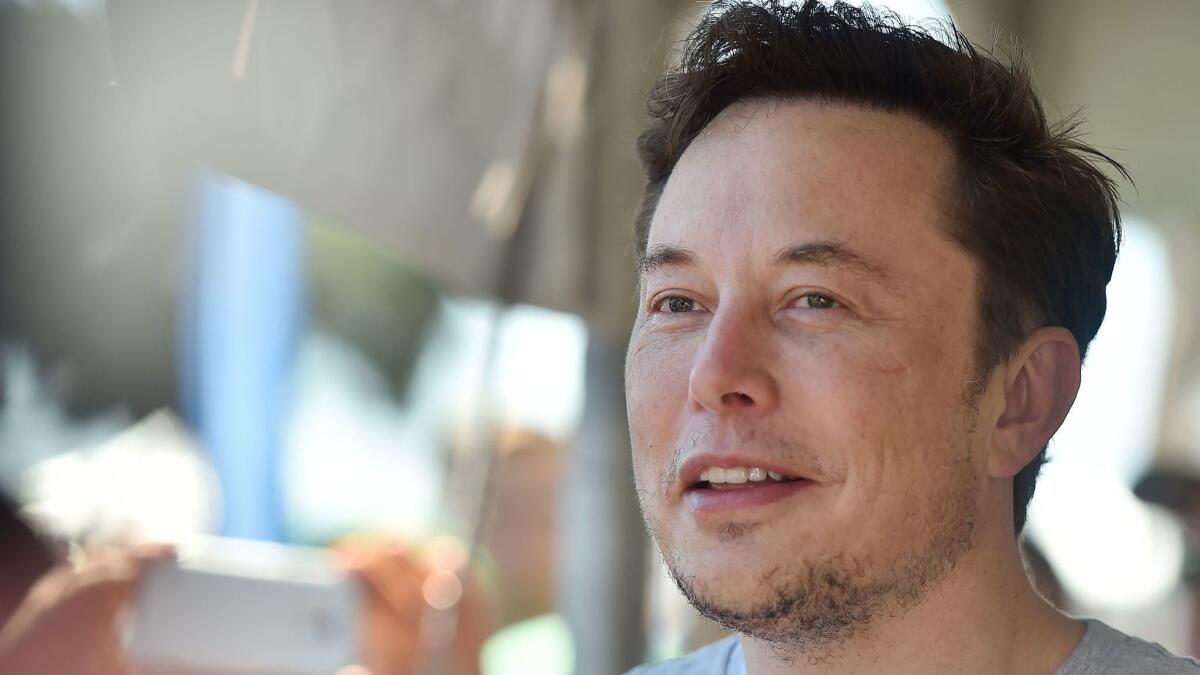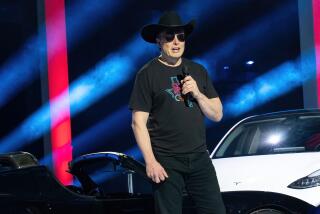What will (or won’t) Tesla’s board of directors do about Elon Musk?

Reporting from Monterey — Tesla is not going private. Chief Executive Elon Musk said so Friday. Now the public company’s board of directors can turn to another serious matter — what to do about Elon Musk.
Musk’s bizarre behavior, inflammatory tweets, flouting of norms governing corporate disclosure, and poor communication with his own board of directors are raising questions about his future at Tesla. So, too, is his inability thus far to raise Model 3 production to projected levels and turn Tesla profitable.
No one at the moment expects the board to dump Musk. But there’s talk about bringing in a chief operating officer, or a co-CEO. Those would be risky moves, given Musk’s domineering personality.
But doing nothing about Musk presents a risk as well, opening the board of directors to increased criticism, shareholder lawsuits, regulatory scrutiny and possible criminal action — especially with the Securities and Exchange Commission investigating Tesla, as Bloomberg reports.
“This is a company is under substantial financial and legal distress at the moment,” said Peter Haveles, a corporate law specialist at the Pepper Hamilton law firm. “Musk’s recklessness with his comments over the last two weeks have caused the company great stress, at a minimum, and possibly subjected it to legal liability.”
Of all Musk’s jaw-dropping tweets — including tagging a diver who helped rescue children trapped in a Thailand cave as a pedophile, with no foundation in fact — the tweet he sent on August 7 is the one causing him and Tesla the most trouble: “Am considering taking Tesla private at $420. Funding secured.”
The tweet sent the company’s stock price soaring as high as $387.56, up 13% from the previous day’s close. After Musk failed to identify any funders or funding, the stock fell again as investors waited to see whether the going-private claim was real, and it has been treading around $320 a share for days.
Many securities law experts, including former Securities and Exchange Commission officials, said the “funding secured” tweet, if false or misleading, could violate federal securities laws.
On Thursday, Tesla’s board decided to drop the private buyout idea and remain a public company. On a Tesla blog post Friday, Musk said talks with shareholders and investment bankers had persuaded him that remaining a publicly traded company was in Tesla’s best interest.
“Fortunately they reversed it quickly enough before more damage could be done,” said Ross Gerber of Santa Monica investment firm Gerber Kawasaki, which holds Tesla stock.
A big fan of both Tesla and Musk, Gerber nonetheless thought going private was a bad idea. “This shows that you have to be very careful what you say on Twitter,” he said. “Hopefully it was a lesson to Elon. Hopefully he’ll be more intelligent about how his actions affect everybody, especially shareholders.”
Musk has copped to over-sharing on Twitter several times in the past, but has failed to show consistent restraint. In an emotional Aug. 16 interview with the New York Times, Musk admitted no one had reviewed the “funding secured” tweet before he sent it, and that the long hours he has spent trying to fix production problems with the new Model 3 sedan have taken a toll.
“If he doesn’t think there will be any consequences, he’s going to keep doing what he’s been doing,” said Jim Rosener, also an attorney at Pepper Hamilton. That’s why now is the time for the board to take real action, he said. “They need to look at their communications policy, and enforce it, educate Mr. Musk about it, and really get a lot more strict about it.”
But, Rosener said, “Based on what I’ve read, I question whether some [Tesla board members] are truly independent and have the gravitas to act as a director and act independently.”
The board has long been criticized as captive to Musk. Musk’s brother Kimbal is a member. Antonio Gracias, the board’s “lead independent” director, is an early Tesla investor and a friend of Musk.
Brad Buss, who led the three member “independent” special committee created two weeks ago to evaluate the proposed buyout and disbanded on Thursday, was chief financial officer of SolarCity from 2014 to 2016, the year Tesla bought that company for $2.6 billion. (Musk was chairman of SolarCity and held 22% of its stock; Musk’s cousins, since departed, ran the company.)
No board member beyond Musk has direct experience in the auto industry. Buss comes closest, serving on the board of Advanced Auto Parts, the retail chain.
Tesla declined a request to interview Musk or members of the board. A prepared public statement Friday from Tesla’s independent directors said in part, “The Board and the entire company remain focused on ensuring Tesla’s operational success, and we full support Elon as he continues to lead the company moving forward.”
What the board should do next, according to Gerber, is bring in a chief operating officer under Musk. “They need someone who has expertise, preferably in the freaking auto industry,” Gerber said.
The ideal candidate, he said, would be “someone Elon can trust. Someone he respects that respects him back would help the company tremendously,” Gerber said.
He pointed to Gwynne Shotwell, chief operating officer as Musk’s spacecraft company, SpaceX, as an example of how such a relationship might work. By all accounts, Musk trusts Shotwell to do her work even if their debates sometimes are heated.
But Musk has burned through dozens of top executives, including Jon McNeill, Tesla’s well regarded head of sales and service. Several employees told The Times that McNeill was regarded as the most likely candidate to partner with and perhaps eventually replace Musk. He quit Tesla to become COO at ride-hailing company Lyft in February.
Finding a number-two for Musk at Tesla with enough talent to fix the company’s problems while willing to bend to Musk’s will could prove impossible.
If he can’t or won’t change, the board will face a tough choice. Move him aside, and the stock price will likely plunge, given how many shareholders believe in his vision of a sustainable energy future with a solar panel on every roof, a storage battery on every wall, and an electric car in every garage. Let Musk be Musk, however, and risk continued controversy.
“Even if you have the perfect board, what do you do when the CEO is not controllable?” said Rosener. “Do you fire him? What to you do to control Elon Musk? I’m not sure anyone can.”
Twitter: @russ1mitchell







